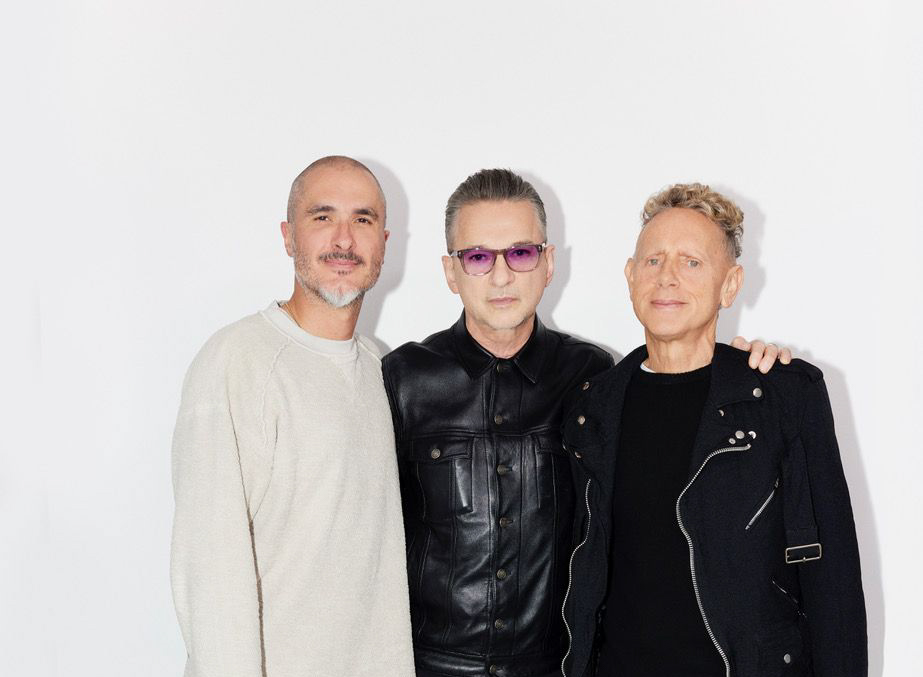
Dave Gahan and Martin Gore of Depeche Mode join Zane Lowe in-studio on Apple Music 1 to discuss ‘Memento Mori’ — their first album in six years out later this week. They tell him about continuing to evolve 40+ years into their career, embracing simplicity on the new project, how they have more new music ready to go, the passing of beloved founding member Andy “Fletch” Fletcher, early influences, how the 1990s ‘Violator’ changed everything for them, writing with Psychedelic Furs’ Richard Butler on the project, their infamous 1998 Rose Bowl performance, and more.
Dave Gahan on Embracing Simplicity on Depeche Mode’s New Album ‘Memento Mori’…
In some of the greatest songs from people like Bob Marley or John Lennon or the simplicity of them is what really stays with you forever. Over complicating things, and sometimes it’s necessary to throw the whole kitchen sink in there and everything when you’re making music, but sometimes it’s just stripping everything away. When making this record, Martin and I were very aware of the fact that it was not to over clutter everything or over complicate things. We had a great team with James Ford and Marty Salogni. It was in the end, just the four of us. It worked out really well. And they were on the same page with us as well, trying to almost, yeah declutter.
Martin Gore on Having Four Additional Songs Ready To Go In the Vault…
We actually recorded 16 songs for this album and it was very difficult to actually choose the 12 that made it. So we have these four, which is very unlike us, in a very, very small vault. Which were finished and mixed and everything. They’re all ready to go. We don’t often have anything in the vault. Trust me.
Depeche Mode Reflect on the Loss of Andy “Fletch” Fletcher…
Martin Gore: Well, I think Dave said recently that he was the band’s biggest fan. And believe it or not, I honestly believe that he enjoyed being in Depeche Mode more than me or Dave. I mean he was larger than life.
Dave Gahan: I think as we get to actually miss Fletch and grieve him through the process of making the record his presence was there. I know that sounds weird, but it was. And it continues when we’re rehearsing now and when we’re doing things and we’ve been out on a promo trip for a while and doing things. Everything that we do without Fletch is a first.
Martin Gore: The first show is going to be kind of… it could be weird for us being there with the audience for the first time. It’s not going to be easy. It’s going to be something that we think about all the time. He’s not here any more. Physically, he’s not here. He was always on my left side. And I looked, even now when we were rehearsing often or when we’ve been doing things when we did our first TV. We did this TV in Italy called the SanRemo Pop Festival just recently. And that was the first time we went on stage and we performed Ghosts Again. And actually, the whole experience was, for me, felt awful. Everything about it was wrong. And although everybody afterwards said, “Oh, it was great. It was great.” All that kind of stuff. I kept thinking about how strange it felt to not have Fletch behind me on there.
Depeche Mode on Their Early Influences…
Dave Gahan: I think initially we both were huge Bowie fans and a lot of Glam. We came out of Glam, T-Rex, and Kraftwork. When Kraftwork came along, they were a huge influence. We were going to clubs and listened to music, Roxy Music, all that kind of stuff. And I liked The Stones too. I like Jagger. And I like their badness. When I say badness, I mean they were the villains. And I like that.
Martin Gore: I’ve always listened to all kinds of music and I think as a songwriter it’s important to be aware of everything that’s out there. If you’re an electronic musician, you shouldn’t just listen to electronic music. It’s interesting to… I like things like Kurt Vile, for instance, and the chords, weird chords or that’s always been very important to me. And I’m really into words. So I obviously like people like Bob Dylan. I mean, I used to like Neil Young a lot. I still like Neil Young.
Dave Gahan: I love Neil Young. I still like Neil Young.
Depeche Mode on How 1990’s ‘Violator’ Changed Everything For The Band…
Dave Gahan: Yeah, I mean, it changed everything because we’d never sold that many records and played to that many people. And everything took off. So yeah, to say everything didn’t change, it would be a lie. Everything did change. The perception of the band, the pressure on my end, the pressure on me as the front guy, everything changed around that time. I think that’s why probably, when we went in to record Songs of Faith and Devotion with Flood producing, he was like, “We have to make a completely different record. Try to take everything away from what we know as being Depeche Mode.” And I think we did. We managed to do that, which was unexpected, and also an incredibly difficult time for the band, probably. We’d reached a point where things, the wheels were starting to come off.
Martin Gore: I think that the success of Violator obviously did put extra pressure on us. I felt incredible pressure to come up with a bunch of songs that could match that, with Songs of Faith and Devotion. And I think that probably started me drinking a bit more. And then Dave went down his own path at that time. I think there is this fallacy that we all have, that drugs and drink make us more creative. It’s very easy to fall into that trap.
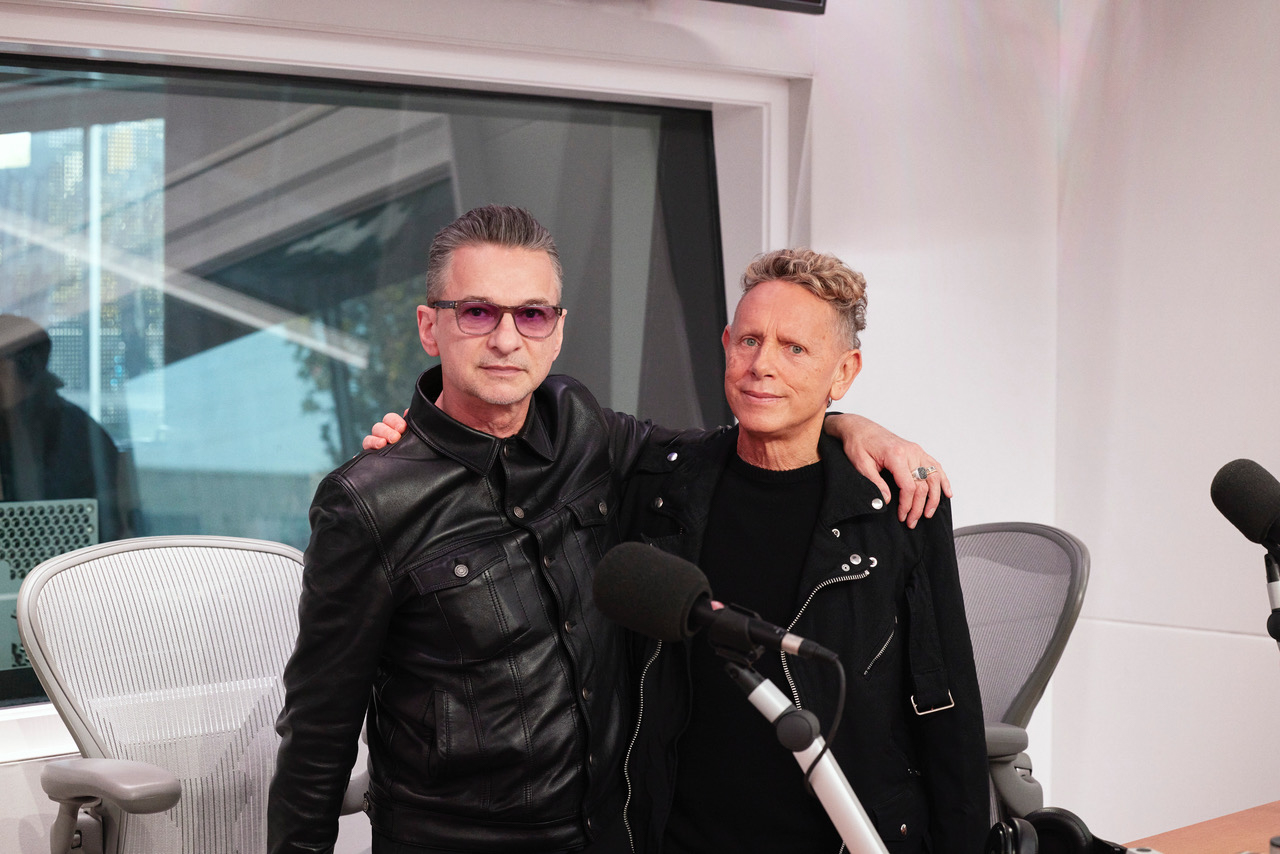
Dave Gahan on Going Down The Path of Drugs and Drinking To Play a Character…
Of course, it’s self-destructive. There was always, for me, with certain drugs, I wanted to feel, again, just the same thing, a part of something. So it enabled me to feel like I belonged to something until it didn’t. And then you were just alone. And I think it’s the same thing, booze, drugs, whatever. You reach a point where you certainly can’t get any more of it in your system without something terrible happening, and for those around you as well. But there is a belief, in the beginning, there was a sort of belief that it was part of the character I was creating.
Martin Gore on Working with Psychedelic Furs’ Richard Butler…
I wrote four of the songs on the album with Richard. Which is something I’ve never done before, working with somebody outside the band. He reached out to me. I think it was around April 2020. The pandemic had hit, and he just texted and said, “We should write some songs together.” And he actually said that to me once before. I don’t know when it was, 10 years ago or something. Nothing ever came of it. But we were in the pandemic, and I thought, if I’m going to try and do something different, now is a good time to experiment. So we did. We just started writing songs together, and we ended up writing six that I really liked. And I thought it would be a waste to use them as a side project, because me and Richard could have just made an album together, written another few and put it out as an album. But I think they would’ve just been lost. So I called him and I said, “Now this might sound a bit crazy.” And I said, “But what do you think about me using the songs for Depeche?” And he said, “Yeah. I love Depeche.”
Depeche Mode on the Importance of the Band’s Infamous 1998 Rose Bowl Performance…
Martin Gore: We were probably talked into that more than anything else. I mean obviously, people said to us, “Things have changed in America. The alternative market is now huge. You can play the Rose Bowl.”
Dave Gahan: We always wanted to end with a special show or something. And yeah, maybe it was presented to us this idea that you come back to California and do a big show. It changed the perception of the band. And we weren’t really that. We weren’t really a stadium band, but all of a sudden the media and everything jumped on this idea. We were certainly doing much better than we ever had. And we were playing to maybe sort of 15, 20,000 people a night, but the Rose Bowl was like 70,000 people or something.
We were not prepared. It probably made me a better performer because I knew I had to, there was something about filling up the space. I was on my own, so I was fighting for connection. So that constant connection with fans, with the audience, with the people that were listening to our music, and I felt that connection. It was tangible, so I hung onto that. And I learned how to then bring that onto the stage and feel like you’re unified. So those moments when that really does happen when you’re performing and you’re all together.
Depeche Mode Tell Apple Music About New Album ‘Memento Mori’, Passing of Andy “Fletch” Fletcher, Continuing To Evolve, Early Influences, and More – Watch below:
Credit: Zane Lowe on Apple Music 1

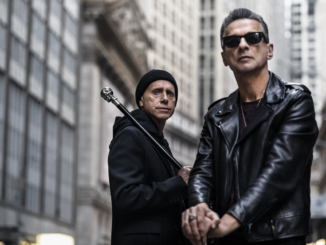
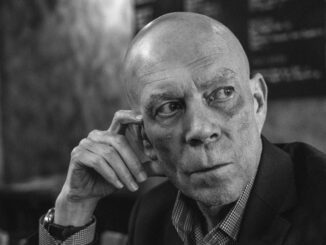
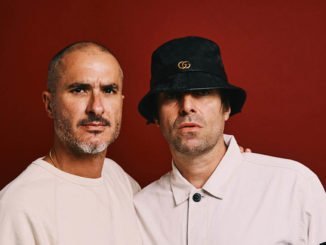

Be the first to comment